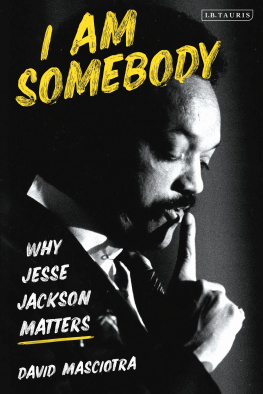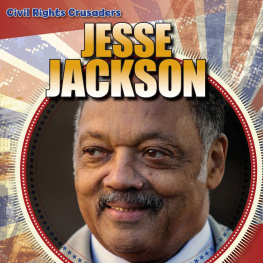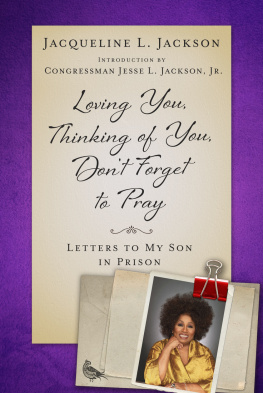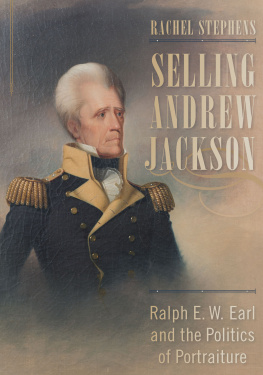I AM SOMEBODY
This book is dedicated to Sarah, for keeping hope alive.
I AM SOMEBODY
Why Jesse Jackson Matters
David Masciotra

If history is to be creative, to anticipate a possible future without denying the past, it should, I believe, emphasize new possibilities by disclosing those hidden episodes of the past when, even if in brief flashes, people showed their ability to resist, to join together, occasionally to win. I am supposing, or perhaps only hoping, that our future may be found in the pasts fugitive movements of compassion rather than in its solid centuries of warfare.
Howard Zinn, A Peoples History of the United States
I may be poor, but I am somebody! I may be on welfare, but I am somebody! I may be in jail, but I am somebody! I may be uneducated, but I am somebody! I am black! Beautiful! Proud! I must be respected! I must be protected! I am somebody!
Jesse Jackson, Leading an audience call and response in 1969
Contents
Chapter 1
REMOVE NOT YOUR ANCIENT LANDMARKS
Chapter 2
THE APOSTLE OF ECONOMICS
Chapter 3
DAVID AND GOLIATH
Chapter 4
PROPHECY
Chapter 5
HOW YA LIKE ME NOW?
Chapter 6
STRANGER IN MY OWN HOMETOWN
Chapter 7
THE THREAT OF PEACE
Chapter 8
THE SIGN OF DEMOCRACY
Chapter 9
AN AMERICAN BLUESMAN
Chapter 10
KEEP HOPE ALIVE
By Michael Eric Dyson
Jesse Louis Jackson was born poor and black in the South seventy-five years after slavery ended. Even though the shackles were removed, oppression remained. American apartheid seemed to get the last laugh by extending the warranty of oppression and etching colored on his birth certificate. Jim Crow filled the sky of black destiny. The wings of segregation shadowed the lives of colored children in its destructive flight. His mother Helen Burns was barely in her teens when she delivered him into poverty and personal peril. At sixteen, she was more than half the age of Noah Robinson, the married man next door who had a son with her that he would seldom see except through the mirror of his childs desperate nostalgiaand then not till fame had kissed him into a precocious legend. The brutal mark of his bastards origin was branded on his generous forehead like an invisible B. The circumstances of his birth sometimes blurred his eyes with grief and at other times moistened them with lament. His foremost biographer Marshall Frady noted his propensity for tears at an early age, showing just how wrong are those who say he only sobs with cameras in view.
Jackson came of age when it was literally against the law for black folk to drink water, or ride buses, or share a meal, or stay in hotels, or vote, or go to school with white folk. It was nearly illegal to imagine that you could do something about it. If you dared to dream that you could rise above your station, there were policemen standing by to remind you of your place by clubbing you upside your head in a show of racial sadism. He came of age when black women were routinely raped and black men were castrated and lynched at the drop of a rope. He came of age when black servicemen returning home from war in their uniforms were murdered by vengeful bigots at bus stops where they waited to join the families they left behind. Dodging the bombs and bullets of exotic enemies, they met death at the hands of domestic terrorists who hid behind religious cloth and crosses.
When it came time for him to get his lesson, as the old folk described formal education in their charming vernacular, he called on a rich cast of characters who bathed him in love: coaches, who instilled discipline on the gridiron and around the hoop; teachers, who fed his huge intellectual appetite; neighbors, who saluted his eerie self-confidence even as a boy; college presidents, who spotted his academic promise and egged him on; and ordinary men and women, who lent him encouragement in the often proud and affirming black world that segregation had no idea that it had helped to create. We often said to oppressors who forced us to live together back then what Joseph in the Hebrew Bible said to his brothers who sold him into slavery but only made him greater: You meant evil against me, but God meant it for good.
While Negroes divided ourselves by shade of skin and pocketbook, racism imposed a lovely and efficient unity on black lifea practical solidarity. Whether we were doctors or ditch diggers, lawyers or landscape architects, automobile mechanics or accountants, carpenters or chemists, nurses or nannies, farmers or pharmacists, secretaries or social workers, or judges or prisoners, we were all colored and just didnt count that much in the white world. Our grand sororities and fraternities didnt impress them. Our big churches didnt make them testify to our spiritual genius. Our thriving colleges and universities didnt make them see how much sense we had. True, the way we hit a hanging curveball or a high C eventually made the white world take notice, but the ordinary Negro rarely crossed the average white persons mind except when he served him a cold drink or passed him by on the street with his hat in his hand to show proper deference. No matter our pedigree or profession, we were often just another nigger. And when white folk took the time to worry about Negroes, it was either our sexual menace or our uppity attitudes that called for adjustment or retaliation.
This is the black-and-white world that shaped Jesse Jackson. This is the world that called forth his stirring oratory, his vital leadership, his gift of prophecy. He had already cut his teeth on local protests in Greenville, South Carolina, where he was born, and, later, in Greensboro, North Carolina, where he went to school, before he burst onto the national scene during the events that led to the famous protest in 1965 at Selma, Alabama. His eagerness to serve and his ambition to lead caught the eye of Ralph Abernathy, the veteran activist and best friend of the movements greatest leader and mouthpiece, Martin Luther King, Jr. Jackson soon earned his way as an apprentice prophet of sorts, throwing in with the band of men and women who helped to change the world before there was an internet or social media. They didnt have Facebook to market their revolution; instead, they faced being booked into jails and relied largely on black-and-white television to beam their unjust imprisonment to the world. They couldnt use Twitter to tweet their message of social redemption, but they could set the nation atwitter with their bold and daring efforts to tweak social change. Before he became a commanding general in the war to remake America, Jesse Jackson was a street soldier who did grunt work to turn the nation even further toward true democracy and real freedom.
When King met his bloody end in Memphis, Tennessee, Jesse Jackson was there with him at the Loraine Motel that evening. Some folk have held this chance occurrence, or this divinely appointed rendezvous with destiny, against him, as if he had something to do with Kings demise, as if he sent that bullet hurtling across air to collapse time and space to a crushing few seconds where, as the rapper The Game brilliantly says, the future took a head shot. But The Game amplifies the suspicion of Jackson when he asks in his rap devoted to King: I wonder why Jesse Jackson didnt catch him before his body dropped/ Would he give me the answer? Probably not. The Games piercing questions echo the sentiments of those who believe that Jackson was overtaken by an ambition so fatal that he would as soon see King die than live and prosper. But thats a mix of bad history and terrible sociology. King was already symbolically dead before he got sent into the ground with an exploding report inside his skull. He was wildly unpopular, he didnt routinely draw big crowds, his former allies fell off, and he would have hardly earned a national holiday had he not been blasted into martyrdom when he got caught in a bigoted assassins crosshairs.










